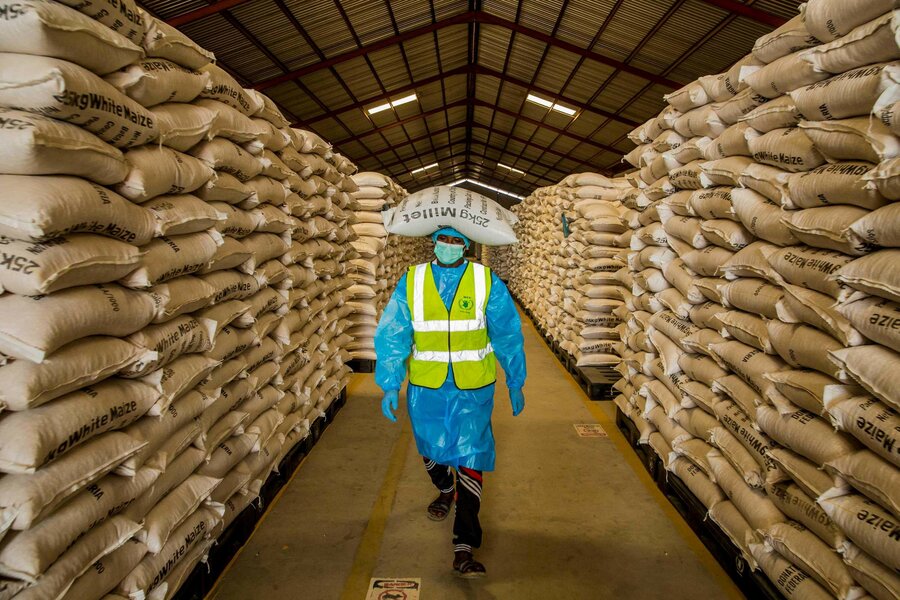Latin America, Caribbean Host School Feeding Forum
Around 200 participants from 18 countries, including government ministers, representatives of civil society, international financial institutions, and the United Nations, are meeting in San Pedro Sula from 15-17 July for a key forum to strengthen commitments to school feeding programs in Latin America and the Caribbean.
The XI Regional School Feeding Forum for Latin America and the Caribbean, co-organized by the Government of Honduras and the United Nations World Food Programme (WFP), is a high-level event for leaders to help transform national school feeding programmes into an engine for social protection, sustainability, and inclusion.
Government-led school meal programmes in Latin America and the Caribbean reach over 80 million children – second to only South Asia, according to WFP’s flagship State of School Feeding Worldwide 2022 report – with a collective annual investment of approximately USD 7.6 billion. These governments are also increasingly choosing to use local produce for school meals; stimulating local markets, and including seasonal foods in school menus.
School meals are a vital way to boost school enrollment and attendance, and offer a return on investment of between USD 7 and USD 35 for every USD 1 invested. In Latin America, they have also proven key in helping to promote healthy eating practices and provide good nutrition for children
A healthy diet in Latin America costs on average USD 4.56 per person per day – the highest daily cost globally, according to the State of Food Security and Nutrition in the World (SOFI) report released in 2024. Around 180 million Latin Americans cannot afford this – and by 2050, climate impacts could increase the cost of a healthy diet by an additional 34 percent.
A Committed Host
Honduras joins the list of countries that have hosted the Regional School Feeding Forums, promoting spaces in favor of children for more than two decades. In the country, over 1.2 million schoolchildren receive sustainable school meals across more than 20,000 pre-primary and primary public schools nationwide. Between 2022 and 2025, the country will invest more than USD 140 million to provide over 79,000 metric tons of fortified food to help prevent childhood anemia and malnutrition.
The National School Feeding Programme, led by the Ministry of Social Development (SEDESOL), aims to ensure food security, school attendance, and the integral development of future generations as part of a national poverty reduction strategy. It reaches nearly 43 percent of school-aged children enrolled in public schools, including 97,400 girls and boys from the country’s nine Indigenous and Afro-Honduran peoples, across 1,074 educational centers.
“The wellbeing of our children is at the heart of our social protection policies and the fight against poverty in Honduras,” said Mirtha Gutiérrez, Minister of Social Development. “The National School Feeding Programme not only ensures food security but also promotes school reintegration and combats child malnutrition. At SEDESOL, we are ready to implement this public policy as a State strategy, strengthening governance and ensuring the sustainable continuity of the programme.”
In close coordination with the Ministry of Education, more than 4,000 school gardens have been established to improve access to fresh foods. Additionally, the country has launched the National Network of Agricultural Schools, comprising of seven specialized schools and more than 200 community-based institutes and associated educational centers.
“This regional forum is a crucial space to showcase the positive experiences in school feeding,” said Minister of Education, Professor Daniel Esponda. “Honduras is building a food autonomy policy, promoting the use of locally produced foods in school meals, with the goal that what is served in schools is grown in the communities themselves.”
WFP Support for National Efforts
WFP works with governments in the region to strengthen national school feeding efforts – with support tailored to the local context. For example, transforming empty shipping containers into kitchens in El Salvador; providing lunches to children affected by violence in Haiti; connecting farms with nearby schools in Guatemala; and promoting fortified rice in schools in Peru.
“We reach students in vulnerable areas with critical support: those affected by drought, environmental degradation, and social exclusion from the Dry Corridor to the high Andean zones to the Amazon,” said Lola Castro, WFP Regional Director for Latin America and the Caribbean. “Delivering life-changing assistance to communities affected by conflict, displacement, and migration, or in places with high malnutrition, poor access to water and health services, and increasing urban food insecurity is critical. Ensuring the quality and coverage of food assistance when funding is limited is not easy. But the returns are undeniable.”
Towards the Global Summit
School meals programmes are the largest social safety net in the world, according to the World Bank, but the scope of these programs is still very uneven across countries. In Latin American and the Caribbean alone, the range is huge with some countries spending only USD 10 per child per year, while others invest up to USD 300.
During the three-day Forum, participants will explore the value of school feeding for greater social protection, explore the role of schools as catalysts for sustainability and resilience, and promote school feeding with a focus on indigenous peoples.
Additionally, the new report “More than a Meal” on the potential of school feeding in Guatemala and Peru to address malnutrition in an efficient and cost-effective manner will be presented. Produced jointly by the Inter-American Development Bank (IDB) and WFP, the report explores how to improve meals in school so that the hours children spend at school count towards improving their nutrition.
Latin America and the Caribbean is a region pioneering the expansion of school meals programmes to meet some of the biggest challenges facing people and our planet – from childhood nutrition to climate resilient food systems. The Forum is a key event to exchange experiences and jointly prepare for the 2nd Global School Feeding Summit, which will take place in Fortaleza (Brazil) at the end of the year.
https://www.wfp.org/news/regional-school-feeding-forum-kicks-latin-america-and-caribbean
View Original | AusPol.co Disclaimer
